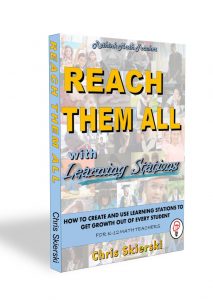

We’ve all had that student who just didn’t get it. This could be for a multitude of reasons. It could be:
– attendance issues
– not paying attention
– academically behind
– needs extra practice
– it takes him longer to do the problems
No matter what the reason, the teacher will have to make a decision: slow down the entire class for this student (or these students)… or move on and hope that they somehow catch up.
If the teacher chooses to leave them behind, they can never catch up. How can you master Algebra, if you failed Pre-Algebra? How can you do long division, if you can’t do short division?
And what are these students to do while the teacher is teaching concepts that they can’t possibly understand, let alone complete? Naturally, they are lost, and going to get off task, give up, or try to hide their ignorance through misbehavior.
In conjunction with the first error, if the class stays behind for these struggling students, what about those who are ready to move on? Now they will learn less than they could have, had they not been forced to remain.
And what are these students to do while the teacher reteaches the same concept all over? They’re not being challenged, nor are they reaching their full potential. Naturally they are bored and might even misbehave as a result.
Have you ever had to learn something new? What happens? You experiment, you fail, you figure out what does and does not work, maybe you watch a video online and correct your errors, until you get it right.
Some skills take us longer to learn than others.
Thomas Edison once said, “I haven’t failed, I’ve just found 10,000 ways that won’t work.”
Making mistakes is part of the learning process. So why are we punishing students for engaging in it?
When a student gets something wrong, they need to be made aware, immediately, and then given an opportunity to do it correctly.
Then celebrate the success (not punish the failure)!
It’s crazy to think about the fact that our current educational system does not expect mastery; but it’s true.
Case and point: When a teacher teaches all of chapter 1, and then someone in the class fails the test at the end of the chapter, what happens to that student?
Answer: they get promoted to chapter 2 with everyone else!
Why would you do that? They didn’t learn what they were supposed to. So why would we stop teaching them the first thing that they were supposed to learn and start teaching them the second thing?
Imagine if your child couldn’t ride a bicycle with training wheels on. So you give him a brief lesson and then a test, and he failed! Would you then take the training wheels off and make him fail at that too?
If a student has not grasped a concept, they should be remediated until they do so (and not at the expense of those who have mastered that skill, by making everyone remediate it).
I often observe teachers who will teach a skill and then have students do a worksheet, independently, to practice – with no chunking of the review. If the student has not already mastered the skill, and thus does not know how to do the problem correctly, but is expected to do all the questions on the worksheet with no help, he/she will do them all wrong.
We have merely reinforced a bad habit.
Students should be given immediate feedback so that they know whether or not they are doing the problem correctly. And, if they are not, they can learn from the mistake and correct the work.
Most teachers are making all five mistakes.
That’s because this is the traditional teaching model. The teacher teaches one lesson to the whole class, everyone practices the skill, then the teacher reviews what was practiced, and then the whole class moves on to the next skill.
Yet we know everyone learns at different speeds, requiring different amounts of practice.
This is how we were taught, this is how all of our co-teachers are teaching, and so this is all we know how.
I propose, that you, Math Teacher, Rethink how you teach!
To learn more about learning station we have an ebook coming soon. Subscribe to the blog to learn more and receive notices when it is available.
[subscribe2]






